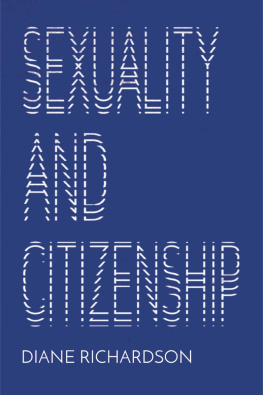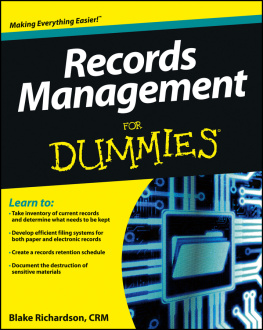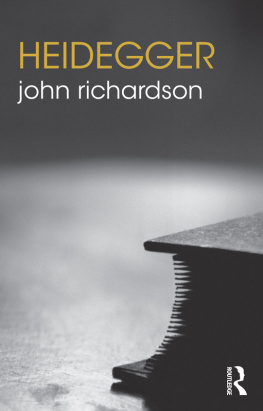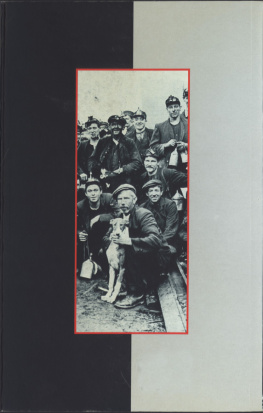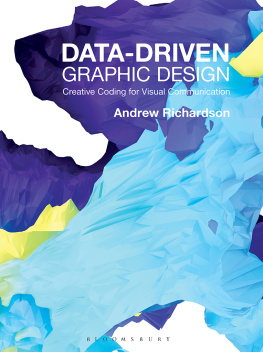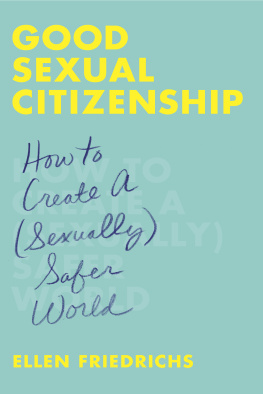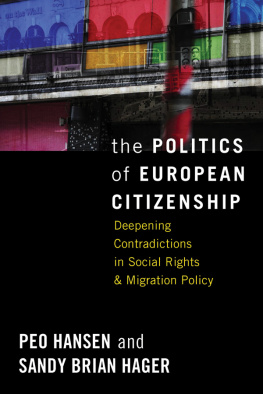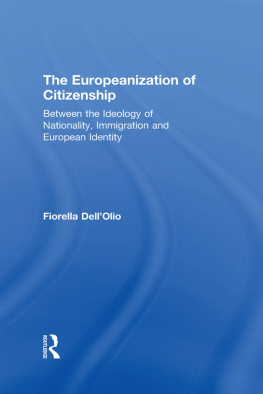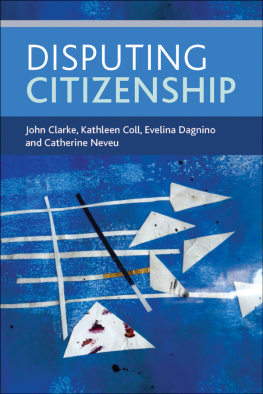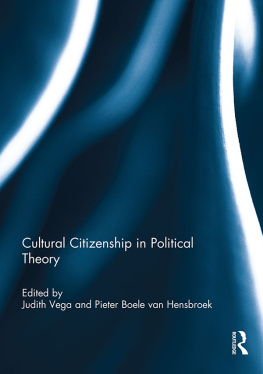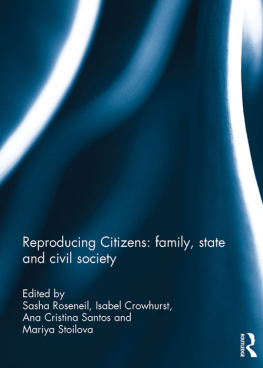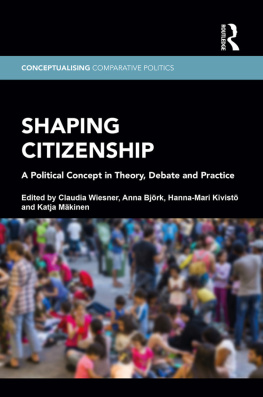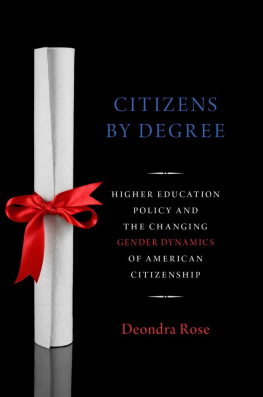Contents
Guide
Pages

For Jane
Sexuality and Citizenship
Diane Richardson
polity
Copyright Diane Richardson 2018
The right of Diane Richardson to be identified as Author of this Work has been asserted in accordance with the UK Copyright, Designs and Patents Act 1988.
First published in 2018 by Polity Press
Polity Press
65 Bridge Street
Cambridge CB2 1UR, UK
Polity Press
101 Station Landing, Suite 300
Medford, MA 02155, USA
All rights reserved. Except for the quotation of short passages for the purpose of criticism and review, no part of this publication may be reproduced, stored in a retrieval system or transmitted, in any form or by any means, electronic, mechanical, photocopying, recording or otherwise, without the prior permission of the publisher.
ISBN-13: 978-1-5095-1424-3
A catalogue record for this book is available from the British Library.
The publisher has used its best endeavours to ensure that the URLs for external websites referred to in this book are correct and active at the time of going to press. However, the publisher has no responsibility for the websites and can make no guarantee that a site will remain live or that the content is or will remain appropriate.
Every effort has been made to trace all copyright holders, but if any have been inadvertently overlooked the publisher will be pleased to include any necessary credits in any subsequent reprint or edition.
For further information on Polity, visit our website: politybooks.com
Acknowledgements
This book represents a process of research and thinking and writing about sexuality and citizenship over many years. My first thanks are to the Leverhulme Trust for granting me a Leverhulme Trust Major Research Fellowship. Writing, like friendship, needs the commitment of time and thoughtfulness. The Fellowship, entitled Transforming Citizenship: Sexuality, Gender and Citizenship Struggles, provided me with the space from September 2013 to January 2016 to carry out a good deal of the research that informs this book. It gave me both the time and the freedom to think. Without the support of the Major Research Fellowship this would be a very different book and one, I imagine, with a rather different publication date.
I want to thank those involved in the process of making this book. Thanks to my publishing editor Jonathan Skerrett and the production team at Polity, in what was a new publishing relationship, for their very efficient and helpful handling of the editorial and production process. My appreciation also to the anonymous readers for their useful feedback. Some of the ideas in the book were provoked by my engagement with two previous research projects funded by the Economic and Social Research Council (ESRC) and I would like to thank my colleagues who worked with me on these. Thanks go to Surya Monro and Ann McNulty on the Sexuality, Equality and Local Governance project, and to Nina Laurie, Meena Poudel and Janet Townsend on the Post Trafficking in Nepal: Sexuality and Citizenship in Livelihood Strategies project. I also owe thanks to Shakti Samuha, our research partner in the Nepal project, one of the first anti-trafficking organizations globally to be founded and run by women who have left trafficking situations, and to all of those who took part in both of the studies. I would also like to acknowledge permission granted under open access licence agreement to reproduce some sections from the article Rethinking Sexual Citizenship published in Sociology (2015), 51(2): 20824.
A good deal of the writing was carried out while I was a Visiting Scholar in the US during the academic year of 2014 to 2015. In the first half of the year, I was based at the Centre for the Study of Women (CSW) and the Department of Sociology at the University of California at Los Angeles (UCLA). I would like to thank staff there for hosting me, in particular Pamela Crespin and other staff in CSW and Gail Kligman and Abigail Saguy in the Department of Sociology, for their support in enabling my visit to UCLA. I also want to thank Evy Blumenberg, Brian Taylor, Jan Lawrence and Russ Worden for their friendship and hospitality. In the second half of the year (wrong way round weather-wise) I was a Visiting Scholar at the Centre for Gender & Sexuality Law (CGSL) at Columbia University in New York. I would also like to offer my gratitude to staff there for hosting me, in particular to the Directors of the Centre, Suzanne Goldberg and Katherine Franke, and to Cindy Gao for her administrative support.
This book has taken me away from family and friends, both literally in some cases and metaphorically in others, and I want to express my gratitude and love to them for continuing to be a source of support in a myriad of ways that contributes to what I can accomplish and who I am and have become. I thank especially Cynthia Chicken-Usher, Jackie Davis, Megan Foster, Loren Fox, Chris Hagar, Nina Laurie, Hazel May, Lillian May Fox, Sue Mitchell, Jane Pollard, Vicki Robinson and Rachel Woodward.
Abbreviations
CEDAWConvention on the Elimination of All Forms of Discrimination Against WomenESRCEconomic and Social Research CouncilGAATWGlobal Alliance Against Traffic in WomenHRCHuman Rights CampaignIDAHOTInternational Day Against Homophobia, Transphobia and BiphobiaILGAInternational Lesbian Gay Bisexual Trans and Intersex AssociationINGOinternational non-governmental organizationIOMInternational Organization for MigrationIRRRAGInternational Reproductive Rights Research Action GroupLGBlesbian, gay and bisexualLGBTlesbian, gay, bisexual and transgenderLGBTIlesbian, gay, bisexual, transgender and intersexLGBTQlesbian, gay, bisexual, transgender and queerLGBTQQIlesbian, gay, bisexual, transgender, queer, questioning and intersexNGOnon-governmental organizationSOGIsexual orientation and gender identityUNHRCUnited Nations Human Rights CouncilUNAIDSUnited Nations Programme on HIV/AIDSVDCsVillage Development Committees
Making Sexual Citizenship
Introduction
I first started to write about sexuality and citizenship in the late 1990s. My route into this was in part due to feminist work that critiqued citizenship conceptually, examining how citizenship is a gendered and raced concept, and in terms of the limits and limitations of a politics of citizenship. It also came out of the meeting of feminism with queer theory while I was conducting research in the US in the early 1990s. I was particularly interested in the rejuvenated interest in both feminist theory and new queer writing around the institutionalization of heterosexuality within society and culture, in particular the ways in which heterosexuality encodes everyday life. This led to an edited collection, Theorising Heterosexuality (Richardson, 1996), whose aim was to invite a radical rethinking of many of the concepts used to theorize social relations. This echoed the call in Fear of a Queer Planet: Queer Politics and Social Theory to interrogate what Michael Warner (1993: xxi) termed the heteronormativity in social theory: heterosexual cultures exclusive ability to interpret itself as society. At the same time, within social and political studies, citizenship was the new black. It was impossible to ignore, coupled with the fact that citizenship was increasingly becoming the lingua franca of political activism around sexual inequality and discrimination. The stage was set.
The concept of sexual citizenship was introduced in 1993 by David Evans in his book Sexual Citizenship, in which he argues that sexual citizenship is materially constructed through the dynamics of late capitalism, in particular through practices of consumption. My early work on sexuality and citizenship had a different focus, in being concerned with analysing citizenship as a key site of heteronormativity and the ways in which different models of citizenship are informed by heteronormative assumptions that reproduce sexual inequalities and privileges (Richardson, 1998; 2000a). However, I was not only concerned with the processes whereby sexuality infused constructions of citizenship, and the social, cultural, economic and political implications of this. I was also interested in examining the relationship between sexuality and citizenship from the reverse direction, in terms of how ideas about citizenship were increasingly shaping debates around sexuality and sexual politics.

